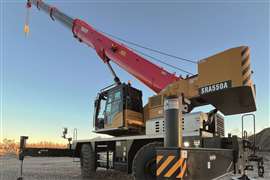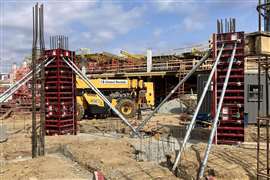Association’s public procurement concerns
04 January 2012
Large areas of public sector activities and services could be excluded from competition as a result of a review of public procurement procedures, the European Federation of Engineering Consultancy Associations (EFCA) fears.
As the European Commission (EC) review of the public market for construction progresses, EFCA, on behalf of the engineering consultancy industry, said it welcomed several significant developments in the proposed EC directives, which it claimed were vital elements in the opening up of the European market and the modernisation of public procurement.
In particular, EFCA endorsed the increased transparency in the competition for service concessions through guidelines that are based on the principles and concepts used in public procurement.
It also welcomed stronger support for innovation, and the new emphasis on sustainable development in procedures and award criteria, notably with regard to lifecycle costing. Improved access for small and medium-sized enterprises (SMEs) to public markets was another positive move singled out by EFCA.
However, EFCA said it was concerned about the conditions of "public-public" co-operation, which were "not sufficiently anchored in the current proposed text of the public procurement directive".
It said this could lead to the abusive exclusion from competition of entire swathes of public sector activities and services. It claimed that this "opens the door for a lurking protectionism to revive".
EFCA said, "This tendency can regretfully already be observed in some countries."
It added that consulting engineers were the linking pin between the awarding authorities - whom they advise and for whom they develop construction and renovation projects - and the firms and suppliers that carry out these projects.
Jan Bosschem, president of EFCA, said at a recent roundtable on European engineering consultancy, "There is no such thing as a European market, only national markets."
EFCA said it felt that while this view was widely shared by awarding authorities, paradoxically, consulting engineering firms were developing a European approach, as illustrated by the panoply of recent mergers and acquisitions in Europe.
It said that this anticipated the emergence of the "Europe of Knowledge", one of the European Union's 2020 goals, which has become even more vital because of challenges to the competiveness of the European economy.
The proposed public procurement directives have to provide the framework for the development of the knowledge economy, of which the engineering consultancy sector is one of the pillars, said EFCA.
It added that it was therefore essential that the role of consulting engineers as independent advisors was preserved, so that they could be powerful vectors in fostering fair competition, throughout the project lifecycle.
In the December 2011/January 2012 issue of CE, the European Construction Industry Federation (FIEC) commented on the EC public procurement review, saying it was disappointed that there appeared to be no improvements over abnormally low tenders despite its lobbying for stricter rules.
It said it felt the competitive dialogue procedure had been improved, but that it believed that the shortening of procedural time limits did not meet the objective of easier access to public procurement for SMEs, as had been promoted by the EC.
A full version of FIEC's look at the European public procurement rules can be found in the digital issue, which can be downloaded.






